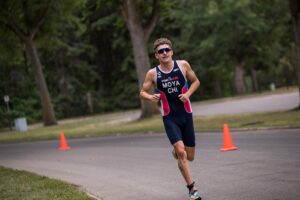The Broderick breakthrough
Jessica Broderick burst on to the triathlon limelight like a comet with her victory at the 2009 USA Triathlon Collegiate Nationals at age 18. She certainly proved she was not a one-hit wonder as she scored very competitive runner-up and 4th place finishes at Collegiate Nationals the next two years. And she proved she was no dilettante as she diligently pursued the sport as a pro the next few years.
And certainly there was no shame with her record for the next few years: In 2010 she was 10th at U.S. Elite Nationals and 9th at the Kelowna B.C. Pan Ams. In 2011 she was 8th at the U.S. Elite nationals. In 2012, she was 6th at the FISU World University Games and 6th at the Kelowna Pan Ams. In 2013, she crossed the line first at the Kemah Triathlon but was DQ’d and scored a 16th and 18th in two World Cups.
At the end of 2013 she met with great discouragement – a maddeningly hard to diagnose leg injury put her into rehab and out of competition for half the year. And in late summer her apartment was hit hard by the Boulder floods.
In this interview, Broderick discusses how the support of family, friends and sponsors gave her the confidence to continue with her sport, why famed coach Darren Smith took her on and how that led to a career breakthrough silver medal at the ITU World Cup at Chengdu this month.

Slowtwitch: You and Kevin McDowell were the USA Triathlon Junior elite triathletes of the year in 2009. If I am not mistaken both of your second place finishes at the 2014 Chengdu World Cup were career breakthroughs. Are you two on some kind of parallel fate track?
Jessica Broderick: Standing on the podium with Kevin was definitely the highlight of my trip to China. We both started racing as juniors back in 2008, and he has been a good friend ever since. Kevin has worked so hard to get where he is today, and overcome so much in the process. It was really special to share this with him.
ST: Last year you were coping with injuries and a homeless stretch enforced by the great Boulder flood. At that point, how hard was it to keep your chin up and native optimism on track?
Jessica: Life is a roller coaster, and last year certainly challenged me in a lot of ways. But it also taught me so much about overcoming adversity. I realized that I just lost a lot of things, but what really matters is the people in your life. The support I got during this time kept me optimistic and believing that good things were around the corner.
ST: What were the injuries you were coping with?
Jessica: I was dealing with an ongoing knee injury last year – an inflamed bursa, edema to the quad tendon and some tendinitis. It was hard to understand the injury completely, which is why I think it took so long to recover.
ST: Who were your coaches at the time? Who were your key rehab physios and doctors?
Jessica: I was working with Grant Holicky and the Apex coaching group at the time. Dr. Richard Hansen with High Altitude Spine and Sport, as well as Dr. Brian Briggs and Dr. Jason Glowney from the Boulder Center for Sports Medicine were the main doctors that helped me through this injury. Erin Carson, a brilliant strength coach at RallySport in Boulder, was instrumental in helping me get healthy through pinpointing specific weaknesses and addressing them in the gym.
ST: Was this your first injury?
Jessica: I had some injuries when I started doing triathlon, mainly from overuse. Having setbacks is part of the sport. As long as you learn from them and understand what you need to do to stay healthy, it isn’t always the worst thing in the world. When you are training and feel things creeping in, you can draw from your memory bank and know you have the tools to prevent the injury from happening again. With a positive attitude, the right rehab program, and a supportive group around you, I think a lot of athletes can come back stronger after injury.
ST: From the date of your injury how long before you were fit enough to think of competing?
Jessica: It was a few months before I was training properly again. I was finally healthy when I joined Darren [Smith’s] squad this year, but had a lot of work to do before I was fit enough to race.
ST: While you could not compete, what work were you involved in to keep food on the table?
Jessica: I had a bunch of little jobs in Boulder – I worked at the front desk of a wellness center, did lots of babysitting, free-lance journalism work, etc.

ST: How hard was it to have your apartment hit so hard? Can you describe that night and what it looked like when the rains let up?
Jessica: Mainly I just felt helpless, like so many people did in Boulder and surrounding areas. Looking back, things could have been so much worse. Even though some of the sentimental stuff was tough to lose, it doesn’t compare to the real tragedy that hit Colorado. Towns were completely wiped out, people lost their lives – I just had an apartment filled with water. When I went out to Left Hand Canyon to volunteer with flood clean up and saw the devastation there, I realized that there was absolutely no way I could complain about what happened to me.
ST: When did you feel like you had returned to health and were mentally and emotionally back in a good routine?
Jessica: There was a period of time in Boulder after the flood and injury when I was a bit confused about what I would do and where I would go. When I received the email from Darren giving me the nod to join his squad, I was excited because I knew this would be my next move, and it was an incredible opportunity at that. This helped me get on track physically, mentally and emotionally.
ST: How much did your friends and family help you get through those tough times?
Jessica: I have amazing people in my life, and I am truly so thankful for each and every one of them. I am very close with my parents and three sisters, and know that they are always just a phone call away if I need a good laugh, encouragement or support. Between Skype calls, Snapchat, texts and emails, they are constantly making me smile. My family is everything, and I wouldn’t be where I am today without them.
ST: I hear that your boyfriend Chris Braden (another CU triathlete grad) recruited some friends to help you out during the flood.
Jessica: During the flash floods, Chris recruited all of his roommates to help me get stuff out of my apartment. I remember running through a parking lot knee deep in water with him and he somehow made me smile and laugh, even though it was utter chaos. I lived with good friends Kevin Collington and Lindsey Jerdonek for about a week, and they spoiled me with great company and delicious meals. Then the Hoops family took me into their home in Boulder, and I ended up living there for three months. Traci, Rich and their four daughters Lexie, Payton, McCall and Remi made me feel so welcome and settled.
ST: When did the idea of working with Darren Smith arise?
Jessica: I had a very open and honest conversation with my Dad mid-summer last year and he asked me, “Are you doing everything possible to be the best athlete you can be?” I enjoyed the training group I was in, loved Boulder, but wasn’t happy with how I was racing for quite some time. I knew I was capable of more, and felt like it would take me leaving Boulder and pursuing a different path to get the absolute most out of myself athletically. I reached out to Darren at the beginning of September last year, after having an interest for quite some time.

ST: What was the process you went through to get on Darren’s squad?
Jessica: I reached out to Darren through email and we communicated for a few months via Skype. At the end of November he decided to take me on, and I met him for the first time in early December in Arizona. Then camp officially started January 1 in Chula Vista, California..
ST: Why do you think Darren took you on? What promise did he see in you?
Jessica: Darren likes a challenge, and I think he saw me as a project worth investing in. I did my homework and pursued him for specific reasons, and I think he recognized and appreciated that. I was also quite persistent, as I felt he was the right coach for me and wanted to be given a shot.
ST: Tell us what led to this wonderful breakthrough?
Jessica: After finishing school I decided to commit full-time to sport, but it wasn’t until I joined Darren’s squad this year that I realized I wasn’t all in beforehand. It was a big decision to leave Boulder, travel the world, live out of a suitcase and be away from family for the majority of the year. However, after experiencing this for four months, I see what truly committing can do. This result is a reflection of that, as well as being surrounded by a world class squad and coach.
ST: How fit were you when you traveled to your first Darren Smith camp?
Jessica: Well, I thought I was in decent shape, but I had tons of work to do. It is one thing to be fit and healthy, and another to be a world class athlete.
ST: When did you begin to see significant improvement?
Jessica: I started to see real progress in mid-March at our second camp in New Zealand. This was when Darren and I finally discussed putting a race on the horizon.
ST: What were you doing differently with Darren Smith and his squad?
Jessica: Eliminating the compromises, attention to detail and mindful application. Consistent work, day in and day out.

ST: Before you got there, what was your strongest discipline of the triathlon? What was your weakest?
Jessica: My background is in swimming, so I would have to say that was my strength. Although, I never swam great in races, so there was quite a bit that Darren changed with my stroke to suit the open water. My weakness was running.
ST: What did you do to improve it?
Jessica: Darren taught me how to run properly, and then it took a lot of mindful running to see improvement. Running technically well was the first step, some good volume followed, and some very hard work as well. It was a progression – I had to be running correctly first to move on to the miles, and once I was strong enough to handle the volume, intensity came in to the picture. It was a process that took a great deal of attention, focus and patience.
ST: What is it like to work with Darren Smith’s D Squad? I know he chooses members carefully to fit with the overall philosophy?
Jessica: They are a great group of people, and I'm lucky to be a part of it. We spend quite a bit of time together, traveling the world from one camp to the next, so we see each other during the highs, lows and everything in between. We are there for each other, because chances are we have gone through something similar at one point in our careers, and have advice to get through. I've learned so much from every athlete in the D squad.
ST: Lisa Norden is training with Darren again. What was it like working with her?
Jessica: I met Lisa for the first time last summer when she was training in Boulder. She was swimming with our group, so I got to know her quite well then. Training with her is an incredible opportunity – I have followed her career ever since I started doing triathlon. In 2009 I was able to watch her duke it out with Emma Moffatt at the Grand Final in Australia (I was there for Junior Worlds) and was blown away by her tenacity and fight. She has been through a lot as an athlete, and what I admire most is how she handles both the highs and lows with such grace and professionalism.
ST: How confident were you going into Chengdu? How much anticipation did you have going into that race?
Jessica: I was really excited to toe the line again. I had been away from ITU racing for 11 months – since the Edmonton World Cup in 2013. I had never trained as consistently and as well as I had in the four months going into Chengdu, so I was confident in knowing I was a better athlete than I had ever been before.
ST: What was the key point in the race where you knew you were solidly in the lead pack?
Jessica: About one minute in to the bike I knew I had made the front group.
ST:Were there any close calls?
Jessica: I had some major mechanical issues on the 4th lap of the bike which left me unable to shift, but I stayed calm and made it work.
ST: Near the end when Gillian Backhouse finally pulled away, what shape were you in? What were you thinking?
Jessica: Gillian gapped me from the start of the run, so she didn’t ever pull away. I had reeled her in a bit in the middle of the run, and the gap was about 8 seconds, but she had another gear on the last lap. I was in pretty rough shape, but that is how it should be when you race! I was trying to stay focused and concentrate on what I needed to do technically to hold it together. I wasn’t thinking about anything else besides what I was doing in the moment.

ST: When you crossed the line, what were you feeling?
Jessica: Relief, excitement, pain, shock and happiness. It was a mixture of emotions, and there were some tears. When you invest yourself completely in something, and see that the hard work is paying off, it is a very special feeling.
ST: What did this finish mean to you?
Jessica: It confirmed that the mental and physical commitment I made at the beginning of the year was worthwhile. My result in Chengdu shows the progress I have made, but I know that I have a long way to go. This is a stepping stone toward my bigger goals.
ST: What did Darren say to you afterward?
Jessica: Darren put a tweet up about being a proud coach, which means a lot to me! We chatted after the race and agreed there were lots of positives. Now we move forward having learned quite a bit from the experience.
ST: When were you able to talk to Chris and your parents? What did everyone say to you?
Jessica: My parents stayed up until almost 3 in the morning to follow my race, and then didn’t sleep at all because they were so excited for me. Chris followed the race as well, and I had tons of messages from him when I got back to the hotel. I have been overwhelmed by the support and love from friends and family since the race. Those that are closest to me know how hard I have worked, and I think they are all happy to see me put together the race I was capable of.
ST: While Kevin McDowell was up against a very serious illness, both of you had to make comebacks and it was very nice to see you both have such a good race. Did you say anything to one another?
Jessica: I finally saw Kevin before the awards ceremony and got a big hug from him. We were both at a loss for words. It was great to share the success with an American teammate.
ST: How do you see the year going forward?
Jessica: I am headed to Dallas for PATCO champs on May 31, then I am off to France for the summer. I will be racing most of the World Cups this year, and am excited for what is to come.
ST: Anything else?
Jessica: I want to give a shout out to OTF Multisport, Team Psycho, Revici and HUUB. I take pride in representing those companies, and appreciate their support. And thanks for the interview!
ST: Thank you for your time – and congratulations!







